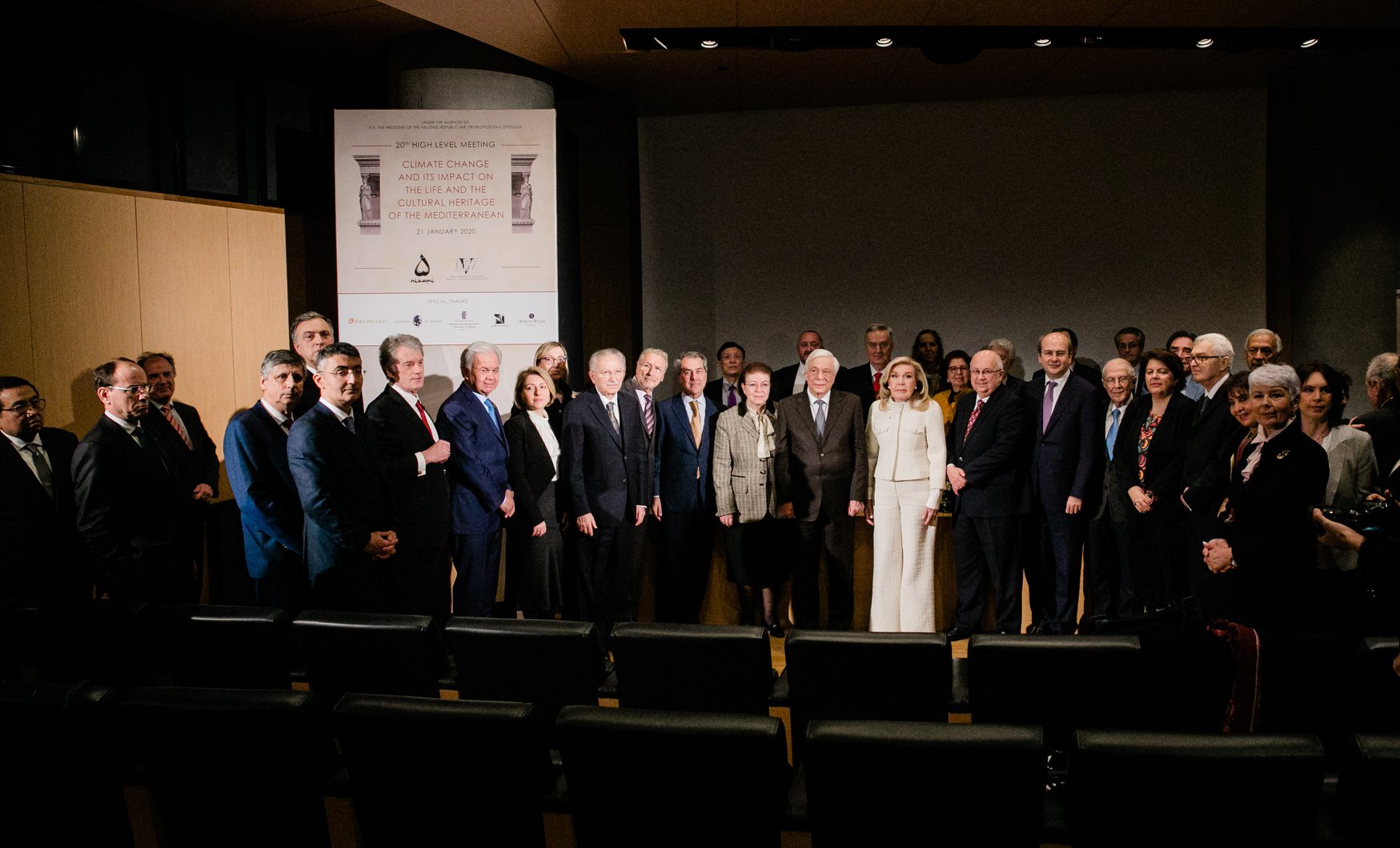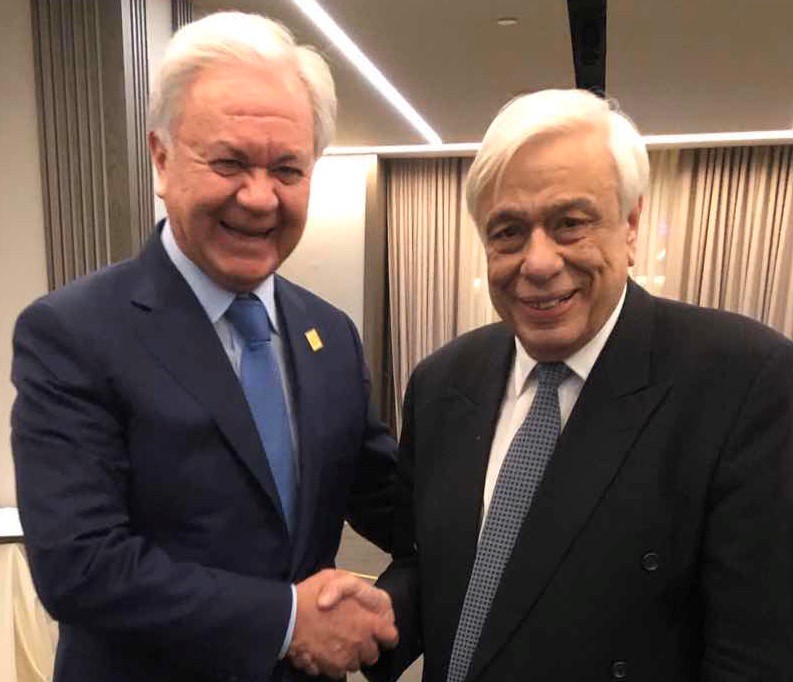Group photo of guests
(Credit: Nizami Ganjavi International Center)
Introduction: On January 20-22, in Athens, Greece, the XX High-Level Meeting under the auspices of H.E. Prokopios Pavlopoulos, President of the Hellenic Republic was held. The theme of the meeting was the "Climate Change: it's impact on the Life & the Cultural Heritage of the Mediterranean". It was organized by Nizami Ganjavi International Center and Marianna V Vardinoyannis Foundation. Dr. Rashid Alimov, Distinguished Fellow of the Taihe Institute and Secretary General of Shanghai Cooperation Organization (2016-2018) attended the High-Level Meeting and delivered a speech on the theme of "2030: Challenges and Opportunities of the Coming Decade: Paradigm Shift in Politics, Business and Society".
The following is the transcribed version of Dr. Alimov's keynote speech.
Dear colleagues,
I never attributed myself to those who are fond of long-term forecasts. The world is changing fantastically fast and any forecast may not last even a day or even an hour. At the same time, there are phenomena and trends beyond which you can still see the distant contours of our world in 2030. Let me share my thoughts on them.
First. According to UN estimations, by 2030 the world's population will grow by one billion and reach 8.5 billion people, every eighth inhabitant of the earth will be over 65 years old.
Second. By 2030, those who were born at the crossroads of millennia will play a noticeable, if not key, role in the political, economic, and social life of countries. Their number will exceed two billion people. It is this generation that will lead the process of changing the technological order in the world, the active introduction of Artificial Intelligence in all spheres of life.
Third. By 2030, economic competition will enter a new level. The leader will be the one who will stand at the forefront of the new technological revolution, put innovation at the center of public policy.
In ten years, it is expected that 20 million or 8.5% of all production jobs in the world will be occupied by industrial robots, of which 12 million in China; 1.9 million in the EU; 1.7 million in the USA; 4.6 million – in other countries of the world.
Fourth. The engine of the global economy in the coming decade will be intra-regional trade. It is obvious that it is multilateral integration institutions such as ASEAN and the African Union, the SCO and the Eurasian Economic Community that will stimulate the rapid growth of regionalization of trade. In turn, the 2018 Agreement on the Creation of the African Continental Free Trade Zone will create a common market with the participation of 1.2 billion people and a total production volume of over $2.5 trillion. Asia and Africa will enter the "start of economic competition" of two continents, which will affect the speed of the global economy.
Fifth. Most likely, e-commerce will become the dominant one in world trade. According to UNCTAD, in 2019 the global e-commerce turnover reached $29 trillion. In the BRICS countries, the average annual growth of electronic commerce was 20%, and this trend will grow steadily. The day is not far off when in most countries where the banking system is developed, mobile payments will become the norm. For example, in 2019 in China, 86% of the population used online wallets (an absolute record). The geography of such examples will be expanding.
Most likely, B2C will become the main direction of the development of electronic commerce in the world. By 2030, 3 out of 4 people will have a mobile device with Internet access, and the middle class will have great purchasing power. Together, these two factors will provide a powerful breakthrough for e-commerce.
Sixth. In 2030, Asia will rightfully become the leading region on the world economic scene. China and USA in PPP will take first and second place in the global economy, India and Japan, respectively, third and fourth places. Partner Countries of China to jointly promote the "Belt and Road" Initiative will be able to fully utilize the potential for transport interconnectivity to enter regional and global markets, as well as developing production chains. In particular, for the landlocked Central Asian states, wide opportunities will be opened up for the development of regional and sub-regional trade and economic ties.
Seventh. By 2030, our planet will become 1.5 degrees warmer. Subject to the Paris Agreement, climate changes will affect the global economy. Africa has great chances to create an agricultural market worth $1 trillion. And not only that. Six "African lions" – Ethiopia and Ghana, Kenya and Mozambique, Nigeria and South Africa, can enthrall most of the countries of the continent and together become creators of the "African economic miracle". UN experts consider this forecast to be quite realistic.
Eighth. Since the beginning of the new millennium, the world has been constantly in a state of change. In the second decade, the situation in global politics and economics experienced a high level of turbulence and tension. In the third decade of the world, a polycentric world order should finally be formed in which, on the basis of broad cooperation, the supremacy of international law will be ensured. Much in world politics and economics will depend on the nature of the interaction between the USA, Russia and China, the most powerful states in the world. The unipolar world has finally gone down in history and this is a completed fact.
Ninth. History reminds us that building a new type of international relationship is always a complex process. The lessons of World War II teach us that only on the basis of mutual respect and mutually beneficial cooperation, equality, justice and peace can be preserved on earth and a shared future can be built. We hope that the coming decade will be a period of deeply rethinking the lessons of the recent past, restoring constructive interaction, primarily between the permanent members of the UN Security Council, and strengthening international cooperation in the interests of preserving peace on earth and sustainable development. As the great French writer Victor Hugo said: "In the human mind, peace can be established by the triumph of justice; in the sphere of material interests – the triumph of progress; between nations – the triumph of fraternity".
Thank You!
Photo of Dr. Rashid Alimov (Left) and H.E. Prokopios Pavlopoulos (Right)
(Credit: by Dr. Rashid Alimov)
—————————————————————
ON TIMES WE FOCUS.
Should you have any questions, please contact us at public@taiheglobal.org

